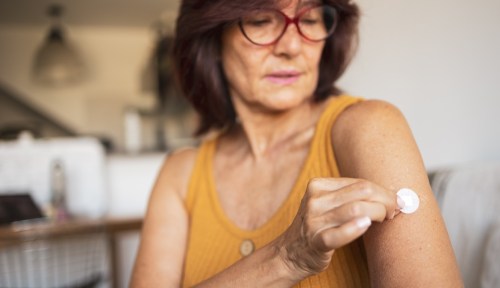A slew of new skin-care products spotlight the latest beauty trend: Menopausal issues such as dryness, loss of volume, and even hot flashes. So, what’s for real, and what’s just hype?
Once upon a time, 50 was considered old, but now it’s badass. Just think about Jennifer Aniston, Jennifer Lopez, Halle Berry, Gwen Stefani, Sarah Jessica Parker, and Kamala Harris—and that’s just for starters. The beauty world is taking notice, and suddenly skin care for people going through (or who already went through) menopause is everywhere.
New lines like Pause Well-Aging, State Of, Emepelle, and SeeMe Beauty address specific issues such as dry skin, wrinkles, and hot flashes. While these companies cater to a huge demographic, we sought out to find whether specifically marketed products for menopausal skin are necessary. The question remains: Do you actually need different skin-care during menopause and beyond?
What is menopause and when does it start?
Menopause officially commences after twelve consecutive months of having no menstrual periods, and the average age this occurs is 51. Perimenopause is the transition to menopause, which typically lasts three to four years, although it could be more. This is when some people may begin to have hot flashes or irregular periods, and the skin starts to become a lot drier. “The stages and symptoms of menopause vary so much from person to person,” says New York City-based obstetrician and gynecologist Ching-Lynn Chen, MD. But the fact is, if you’ve ever menstruated then eventually, like winter, menopause is coming.
What does menopause do to your skin?
“Think of estrogen as a youthifier,” says Heidi Waldorf, MD, a dermatologist based in Nanuet, New York. “It supports so many functions of the skin, from cellular turnover to collagen and elastin production.” It’s also instrumental in producing sebum (oil) and maintaining the skin’s moisture levels. As you start to go through perimenopause, estrogen levels begin to drop, and consequently so does the amount of collagen you have. “It can decrease up to 30 percent in the first five years of menopause, and this is what leads to wrinkles and sagging,” says Dr. Waldorf. Basically, menopause is when the factory workers in your skin start to go into retirement and production slows to a crawl, leaving your skin papery-thin and parched. But the good news is that there are plenty of products (not just ones specifically made for menopause) that will help hydrate and strengthen the skin barrier and boost collagen.
How should you adjust your skin-care routine during menopause?
“It’s similar to transitioning your skin care with the seasons,” says Dr. Waldorf. “My advice is not to wait until menopause hits and your skin is super dry. Start a good moisturizing and retinol routine in your 30s and early 40s to offset the signs of aging.” She recommends using products that contain hydrating ingredients like hyaluronic acid and glycerin, as well as emollients such as squalane and ceramides to help protect and strengthen the skin barrier. To keep the collagen factory running as effectively as possible, opt for products with retinol, a gold-standard “anti-aging” ingredient that helps to stimulate collagen production. Dr. Waldorf recommends using an over-the-counter product with retinol a few times a week in your 20s and 30s, and then revving up to a prescription-strength retinoid during perimenopause.
Do you need products designed specifically for menopausal skin?
Not really—as long as you know how to read an ingredient label. “You don’t need a menopause product to get good moisturizing ingredients. You can find them in many good drugstore moisturizers,” says Boston-based dermatologist Ranella Hirsch, MD. But if you don’t feel like reading labels, it’s nice to know that all the new menopause lines have face creams, lotions, and serums that contain excellent hydrators and emollients.
Retinol is a bit trickier. It’s hard to find the collagen-boosting ingredient in menopause-specific skin care—perhaps because it can be drying or irritating if not formulated well. One exception is Emepelle Night Cream ($195), which contains retinol along with peptides and a unique active ingredient: Methyl estradiolpropanoate (the company calls it MEP technology). The ingredient interacts with the estrogen receptors in the skin to increase moisture retention and improve elasticity and collagen production. “Most medical experts consider this ingredient to be safe, and it’s definitely interesting,” says Dr. Hirsch. “There’s legitimate clinical data on this, but the studies suggest only a mild improvement in the skin, so it’s far from a home run.”
Pause Well Aging Collagen Boosting Moisturizer ($72) and State Of Rich Facial Moisturizer ($32) use peptides to support collagen production. “Peptides are building blocks of proteins like collagen, and some are messengers that signal fibroblasts to make more of it,” says Dr. Hirsch. “But it’s debatable how effectively a topical peptide can be at actually triggering that production.”
And Pause Well Aging also makes a Fascia Stimulating Tool ($115) that looks like a chic stainless steel bottle opener and is designed to be rolled over the face and neck to improve elasticity and firmness. “Theoretically this is supposed to stimulate the fibroblasts in the fascia, the connective tissue in the body,” says Dr. Waldorf. “While this tool could help with lymphatic flow, minimizing puffiness, and increasing blood flow to the skin, much like a face massaging roller, I don’t see it as something that’s going to increase collagen formation or affect long-term change.”
And several brands make menopause-specific topical cooling sprays that help offset hot flashes, but “any face mist stored in the fridge will cool you off,” says Dr. Waldorf.
So, is menopause skin-care all hype?
“If you’re suffering with dry skin that’s changing as you get older, then these products are a nice starting point, but simply adding a moisturizer and a retinol will do the trick,” says Dr. Waldorf. Dr. Hirsch agrees: “It’s like hiring a florist because they label themselves as a ‘wedding florist.’ A regular one that does beautiful work is just as good.”
That said, there are other benefits to this influx of skin care. “The M-word used to be spoken about in a whisper, but this trend is opening up a conversation about menopause,” says Dr. Waldorf. Not only does that help to educate and empower women going through this life transition, it helps society as a whole to normalize aging. “It’s just another stage of life,” says Dr. Waldorf, “Women are more vibrant and vital than ever as they get older.”
Oh hi! You look like someone who loves free workouts, discounts for cult-fave wellness brands, and exclusive Well+Good content. Sign up for Well+, our online community of wellness insiders, and unlock your rewards instantly.
Sign Up for Our Daily Newsletter
Get all the latest in wellness, trends, food, fitness, beauty, and more delivered right to your inbox.
Got it, you've been added to our email list.











